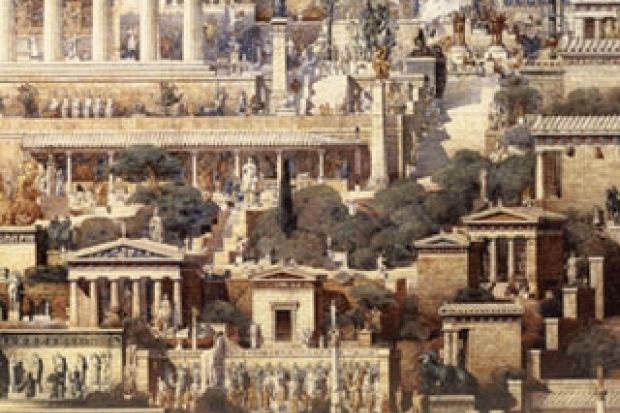An ancient poem reveals how the Delphic oracle was founded. According to the Homeric Hymn to Apollo, the god himself travelled all over Greece until he reached “a crag, a hollow under snowy Mount Parnassos, above a rocky plain”. There Apollo decided to set up a sanctuary where he would give “unerring counsel” to mortals. The story, however fanciful, is set in a real and recognisable landscape: we can plot exactly where Apollo went in his travels and where he finally established his oracle. A mixture of imaginative narrative and precise geography is typical of Greek myth and suits Michael Scott’s approach: he deftly combines literary and material evidence in order to offer a history of the Delphic oracle from the 7th century BC to the end of pagan antiquity in the 4th century.
In 2010, Scott wrote and presented an excellent BBC documentary entitled Delphi: The Bellybutton of the Ancient World. This book covers some of the same ground, but offers a much broader and more detailed account. The first part deals with the murky origins of the oracle; the second explores how Delphi established itself as one of the most important religious centres in the ancient world; and the third considers the later history of the site and its struggle to remain relevant after the conquests of Alexander the Great, the Roman Empire and the advent of Christianity. The question at the heart of the book is a straightforward one: “How did the oracle work, and why did it capture the attention of the ancient world for so long?”
Many have tried to explain why the supposedly rational Greeks travelled from far and wide in order to interrogate the oracle. Ostensibly, all that happened at Delphi was that a priestess of Apollo offered obscure responses in answer to the pilgrims’ most pressing questions. Some scholars present the whole ritual as a hoax, but they must still explain how this particular hoax succeeded for more than 1,000 years. Others look for modern analogies, insisting that we too need answers and advice - or at least a supportive context in which to articulate our questions. Finally, some try to explain the oracle with reference to geography: two geological fault lines cross at Delphi, and perhaps small quantities of inebriating gases were released between the rocks, inspiring the priestess. (This last hypothesis is uncertain, in geological terms, and in any case fails to explain how the priestess in turn inspired others.)
Scott offers a mixture of these different explanations, producing a judicious analysis that foregrounds Delphi as a political as well as a religious centre. He seems to lose perspective only in relation to his own book, which he presents as “a manifesto for how we should study this (and indeed other) crucial locations from the ancient world”. In fact, books by a number of other scholars combine textual and material evidence in a similar way and investigate the history of classical sites beyond the classical period.
Moreover, the tone of the book can be uneven and, on the whole, I am left with the impression that television may be a better fit for Scott, as a medium, than the monograph. Some sentences from this book would need to be rephrased (eg, “to see Delphi as the ancients saw it…we need to consider the sanctuary’s whole history” - that whole history was of course not available to “the ancients”); others are repeated too often (eg, that the oracle was an ancient “management consultant”). These are, however, stylistic quibbles. Overall, Scott offers a broad and well-documented history of the Delphic oracle, including an (excellent) epilogue on how the site was rediscovered at the end of the 19th century.
Delphi: A History of the Center of the Ancient World
By Michael Scott
Princeton University Press, 448pp, £19.95
ISBN 9780691150819 and 9781400851324 (e-book)
Published 2 April 2014
Register to continue
Why register?
- Registration is free and only takes a moment
- Once registered, you can read 3 articles a month
- Sign up for our newsletter
Subscribe
Or subscribe for unlimited access to:
- Unlimited access to news, views, insights & reviews
- Digital editions
- Digital access to THE’s university and college rankings analysis
Already registered or a current subscriber? Login





